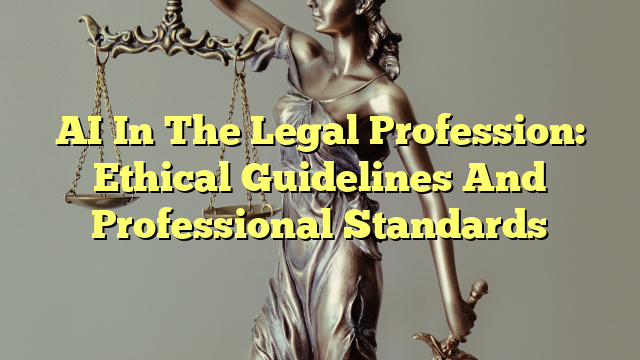Table of Contents
- Introduction
- Ethical Issues with AI in the Legal Profession
- Ethical Guidelines for AI
- Usage of AI in the Legal Profession
- The Four Framework Principles
- Conclusion
Introduction
AI is becoming increasingly commonplace in the legal profession. As with any new technology, it raises ethical and legal questions. It is important for lawyers and legal professionals to understand the ethical issues that arise when using AI and to be aware of any relevant ethical guidelines and professional standards. This article will explore the ethical issues surrounding AI in the legal profession, outline the ethical guidelines that have been established, discuss how AI is used in the legal profession, and examine the four ethical framework principles for AI.
Ethical Issues with AI in the Legal Profession
AI in the legal profession raises a number of ethical issues. First, there is the concern that AI is not able to consider the ethical or moral implications of its decisions. AI algorithms are programmed to make decisions based on certain factors, and these decisions do not necessarily take into account ethical or moral considerations. This can lead to ethical dilemmas, such as when an AI algorithm is used to make decisions about sentencing or parole. Second, there is the concern that AI algorithms may be biased. AI algorithms are only as good as the data they are trained on, and if the data is biased, then the decisions made by the AI algorithm may also be biased. This can have serious implications, especially in the legal profession where decisions are often of great consequence. Third, there is the concern that AI algorithms may reduce the need for human judgement. AI algorithms can make decisions more quickly than humans, and this can lead to human judgement being replaced by AI algorithms. This could have a negative effect on the legal profession, as important decisions about justice and fairness may be made without the input of a human.
Ethical Guidelines for AI
In order to address these ethical issues, a number of ethical guidelines have been established. The American Bar Association has issued ethical guidelines for the use of AI in the legal profession. These guidelines emphasize the importance of respecting the privacy of clients, protecting confidential information, and ensuring that all decisions made by AI algorithms are fair and just. Additionally, the ABA has issued a set of ethical principles for the use of data and analytics. These principles emphasize the importance of ensuring that all data used by AI algorithms is accurate and up-to-date, and that all decisions made by the AI algorithm are based on reliable and trustworthy data.
Usage of AI in the Legal Profession
AI is being used in a variety of ways in the legal profession. AI algorithms can be used to quickly process large amounts of data, such as in document review. AI algorithms can also be used to identify patterns in legal documents, such as to identify relevant case law. Additionally, AI algorithms can be used to predict the outcomes of certain cases, such as to predict the outcome of a trial or the likelihood of a settlement. AI is also being used to automate certain tasks, such as the drafting of contracts, the filing of documents, and the scheduling of meetings.
The Four Framework Principles
In order to ensure that AI algorithms are being used responsibly and ethically, the American Bar Association has established four ethical framework principles for the use of AI in the legal profession. These principles are:
-
- Responsibility: AI algorithms should be used responsibly and ethically, and all decisions made by AI algorithms should be made in accordance with the law and ethical standards.
- Transparency: AI algorithms should be transparent, and the decisions made by AI algorithms should be understandable and explainable.
- Accountability: Those responsible for AI algorithms should be held accountable for the decisions made by the AI algorithms.
<li


The legal profession should consider proactive outcomes and solutions when dealing with AI- not just ethical guidelines.